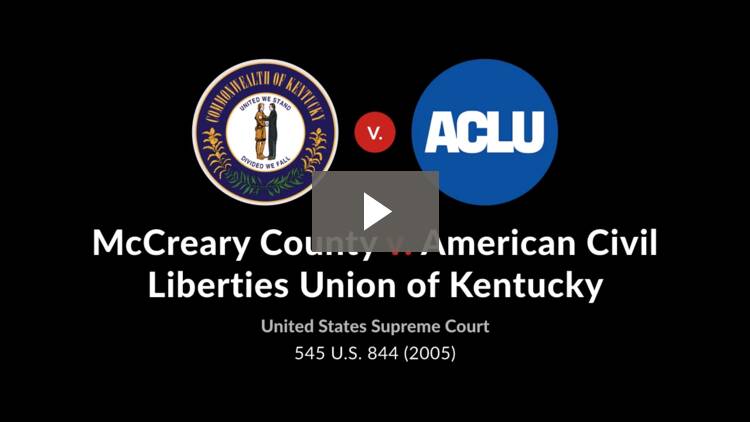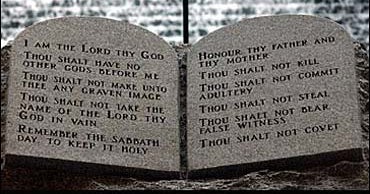Mccreary County V Aclu Case Brief
The decisions that got the most media attention were the Courts split rulings in McCreary County Kentucky v. Synopsis of Rule of Law.

Mccreary County V American Civil Liberties Union Of Kentucky 545 U S 844 2005 Case Brief Summary Quimbee
SUPREME COURT OF THE UNITED STATES.

. Certiorari to the united states court of appeals for the sixth circuit. Supreme court of the united states. McCreary County Ky 96 FSupp2d 679 682 n.
01-5935 6th Cir chronicling the influence of each Commandment on colonial law governing blasphemy profanity idolatry Sunday closings murder adultery theft perjury defamation and election fraud. 6 849 Mathew D. Audio Transcription for Opinion Announcement June 27 2005 in McCreary County v.
McCREARY COUNTY KENTUCKY et al. See united states v. This case began as a challenge to solitary displays of the Ten Commandments in two county courthouses.
Furer 105 P2d 299 301 Cal. PETITIONERMcCreary County Kentucky et al. AMERICAN CIVIL LIBERTIES UNION OF KENTUCKY et al.
Two counties placed the Ten Commandments citing King James Version on the walls of the court house. Placing religious documents on court house walls is a violation of the Establishment Clause and will not be allowed. AMERICAN CIVIL LIBERTIESUNION OF KY.
McCreary County Kentucky v. And we will now hear argument in McCreary County against the ACLU. United States Court of Appeals for.
Supreme Court of United States. In the same day the Supreme Court ruled in favor of the Ten Commandments display in Van Orden v. ACLU June 27 2005.
Perry McCreary County v. Detroit timber lumber co 200 us. Mccreary Vs Kentucky Case Summary.
See ACLU of Ky. 031693Argued March 2 2005Decided June 27 2005. Becket filed an amicus brief in both cases arguing such displays are both culturally valuable and constitutionally permissible.
Justice Stevens and may it please the Court. As a result the American Civil Liberties Union argued that this religious display violated the first 10 amendments of the. Mccreary county kentucky et al.
The American Civil Liberties Union ACLU sued three Kentucky counties in federal district court for displaying framed copies of the Ten Commandments in courthouses and public schools. The issue at hand was that two Kentucky county courthouses displayed the 10 commandments publicly. 844 was a case argued before the Supreme Court of the United States on March 2 2005.
Nor is there any indication that the purpose enquiry is rigged in practice to finding a religious purpose dominant every time a case is filed. ACLU of Kentucky - SCOTUSblog. American Civil Liberties Union of Ky.
1 Whether factors such as the passage of time and a change in governmental decision-makers suffice to permit a display that included the Ten Commandments when an earlier display that included the Ten Commandments had been deemed unconstitutional. AMERICAN CIVIL LIBERTIES UNION OF KENTUCKY et al. Certiorari to the united states court of appeals for the sixth circuit.
McCREARY COUNTY KENTUCKY et al Defendants-Appellants On Appeal from the United States District Court for the Eastern District of Kentucky District Court Consolidated Case No. 4 Argued March 2 2005. ACLU Brief for Respondents in McCreary County v.
5 Decided June 27 2005. American Civil Liberties Union 545 US. Perry the Supreme Court ruled 5-4 against the Ten Commandments display in a Kentucky courthouse.
The ACLU argued the displays violated the First Amendments establishment clause which prohibits the government from passing laws respecting an establishment of religion. Any minimal variances among the three displays possess no legal significance for the purpose of the motions now pending before the court. The wavering unclear reasoning seems to indicate the wavering and unclear understanding our.
Email Address ZIP Code Leave this field blank. With him on the briefs were Erik W. The Court decided this case the same day as another Ten.
- Case Briefs - 2004. After the plaintiffs filed suit the Counties authorized a second expanded display by nearly identical resolutions stating among other things that Jesus. ACLU Brief for Respondents in McCreary County v.
Staver argued the cause for petitioners. RESPONDENTAmerican Civil Liberties Union of Kentucky et al. AMERICAN CIVIL LIBERTIES UNION OF KENTUCKY ET AL.
In McCreary County v. 847 7374 105 SCt. American Civil Liberties Union of Ky.
Rehnquist Court 1986-2005 LOWER COURT. The counties in this case posted portions of the Ten Commandments along with selections from other documents such as quotes from the Declaration of Independence and lyrics from the Star Spangled Banner as part. McCREARY COUNTY KENTUCKY ET AL.
2722 2005 545 US. American Civil Liberties Union of Ky. CIVIL LIBERTIES UNION2725 Cite as 125 SCt.
The County of McCreary. 99-507 BRIEF AMICUS CURIAE OF FOUNDATION FOR MORAL LAW. At issue was whether the Court should continue to inquire into the purpose behind a religious display and whether evaluation of the governments claim of secular purpose for the religious displays may take evolution into.
C The Court also avoids the Coun-. ACLU of Kentucky 2005 was a case that was presented to the supreme court. American Civil Liberties Union of Ky.
844 2005 the Supreme Court relying heavily on the history behind the exhibited images in question held 5-4 that Ten Commandment displays in two Kentucky county courthouses violated the establishment clause of the First Amendment. ACLU of Kentucky 03-1693 and Van Orden v. Perry 03-1500 the two cases concerning government displays of the Ten Commandments.
American civil liberties union of kentucky et al. ACLU declared displays of the Ten Commandments in two Kentucky county courthouses to be unconstitutional. Before the district court ruled the counties expanded their displays on two occasions and issued resolutions stating that the Ten Commandments were their precedent.
2 EDKy2000 This is one of three companion cases simultaneously filed which attack such displays. 1940 Thou shalt not steal applies with equal force and. Hollywood Motion Picture Equip.
Justice OConnor agrees with Justice Souters dissent and cites to her own concurring opinion in McCreary County v. Perry is significant case because of the lack of clarity in the pluralitys opinion. In 1999 the American Civil Liberties Union of Kentucky ACLU plaintiff sued the counties in federal district court on the grounds that the displays violated the Establishment Clause of the First Amendment.
American Civil Liberties Union of Kentucky 545 US. In the interest of full disclosure Wiggin and Dana filed an amicus brief in both cases on behalf of the Anti. Green and Mary E.

An Introduction To Constitutional Law Mccreary County Kentucky V Aclu Of Kentucky


No comments for "Mccreary County V Aclu Case Brief"
Post a Comment